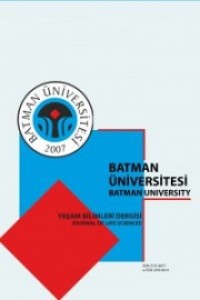Öz
Anahtar Kelimeler
İslami Romanlar Hidayet Romanları Rüyanın İşlevleri Rüya Kurgu
Kaynakça
- Aydar, H. (2005). Kur’an’da Rüyalar ve Rüyaların Hayata Yansımaları. Dinbilimleri Akademik Araştırma Dergisi, 5(4), 39-60.
- Aydın, H. (2007). İslam Felsefesinde Rüya Kuramı, İşlevleri ve Kimi Sonuçları. Ondokuz Mayıs Üniversitesi İlahiyat Fakültesi Dergisi, 23(23), 165-178.
- Bars, M. E. (2018). Kıssa-i İbrahim: Mukayeseli Bir Araştırma. Ankara: Sonçağ Yayınları.
- Canan, İ. (1988a). Hadis Ansiklopedisi Kütüb-i Sitte (Cilt 2). İstanbul: Akçağ Yayınevi.
- Canan, İ. (1988b). Hadis Ansiklopedisi Kütüb-i Sitte (Cilt 3). İstanbul: Akçağ Yayınevi.
- Cilasun, R. (1975). Oğlum Osman. İstanbul: Hisar Yayınevi.
- Dev, M. (2006). Rahibe Kety. İstanbul: Nesil Yayınları.
- DİB (2011). Kur’an-ı Kerim ve Meâli. Ankara: Diyanet İşleri Başkanlığı Yayınları.
- Efe, M. (2016). Mızraksız İlmihal. İstanbul: Kapı Yayınları.
- Ertuğrul, H. (2006). Kendini Arayan Adam. İstanbul: Nesil Yayınları.
- Freud, S. (1995). Psikanaliz ve Uygulama. (Çeviren: M. Sencer). İstanbul: Say Yayınları.
- Freud, S. (2014), Psikanaliz Üzerine. (Çeviren: A. A. Öneş). İstanbul: Say Yayınları.
- Freud, S. (2015a). Rüya Yorumları 1. (Çeviren: A. Kanat). İstanbul: Say Yayınları.
- Freud, S. (2015b), Rüya Yorumları 2. (Çeviren: A. Kanat). İstanbul: Atlantis Yayınları.
- Gültepe, N. (2015). Türk Mitolojisi. İstanbul: Resse Yayınları.
- Günay, M. (1990). Arzunun Kıskacında. İstanbul: Beka Yayınları.
- Gündüz, E. (2009). Divan ve Halk Edebiyatı Sanatçılarına İlham Kaynağı Olan Rüya, Selçuk Üniversitesi Sosyal Bilimler Enstitüsü Dergisi, (22), 187-202.
- Gürbüz, A. (2019). Türk Edebiyatında İslami Romanlar. Ankara: Sonçağ Yayınları.
- İnal, M. (1994). Ayrılık Benimle Kaldı. İstanbul: Timaş Yayınları.
- İnanç, Ü. (1987). Yalnız Değilsiniz. İstanbul: Tuğra Neşriyat.
- İsmail, H. (2014). Minyeli Abdullah. İstanbul: Timaş Yayınları.
- Kartal, H. (1990). Ve Yollara Günah Diktiler. İstanbul: Mektup Yayınları.
- Kazancı, A. L. (2011). Bir Vicdan Uyanıyor. İstanbul: Ensar Neşriyat.
- Şenler, Ş. Y. (2011). Huzur Sokağı. İstanbul: Timaş Yayınları.
- Turhal, Ş. K. (1999). Müslüman Kadının Adı Var. İstanbul: Adese Yayıncılık.
- Uzunyaylalı, M. T. (1992). Senatör’ün Kızı. İstanbul: Beka Yayınları.
- Yılmaz, E. B. (2011). Hikâye ve Romanlarda Sembol Dilinin Görüntüleri Üzerine Bir Değerlendirme, Bilig, 56, 45-56.
Öz
Islamic novels begin to be written from the 1970s and attracted much attention until the 1990s. The Islamic community, which has stayed away from the novel until then, has showed great interest in these books where Islamic sensitivities were processed, tried to educate their children through fiction. These novels, which are seen as a kind of alternative / counter literature for the Islamic community, have gained great popularity and broke sales records over time. In this context, Islamic novels have made a name for themselves in a period of Turkish literature and reached large audiences. Although Islamic novels were simplified by literary critics, they were not seen in society in the same way and saw great interest.
This study aims to examine the dream element and the functions of the dream in Islamic novels, which have become a representative of a certain group in our literature and changed the perspective of the conservative community to school/reading. Thirty writers from the leading Islamic novelists of Turkish literature were selected in the study and a sample of these novelists was examined. As a result of the study, the purpose of the use of dreams in Islamic novels, the function of dreams in the novel fiction and the messages, what kind of meanings are given to dreams and so on. It will be tried to be determined.
Anahtar Kelimeler
Islamic Novels Guidance Novels Dream Function of Dream Fiction
Kaynakça
- Aydar, H. (2005). Kur’an’da Rüyalar ve Rüyaların Hayata Yansımaları. Dinbilimleri Akademik Araştırma Dergisi, 5(4), 39-60.
- Aydın, H. (2007). İslam Felsefesinde Rüya Kuramı, İşlevleri ve Kimi Sonuçları. Ondokuz Mayıs Üniversitesi İlahiyat Fakültesi Dergisi, 23(23), 165-178.
- Bars, M. E. (2018). Kıssa-i İbrahim: Mukayeseli Bir Araştırma. Ankara: Sonçağ Yayınları.
- Canan, İ. (1988a). Hadis Ansiklopedisi Kütüb-i Sitte (Cilt 2). İstanbul: Akçağ Yayınevi.
- Canan, İ. (1988b). Hadis Ansiklopedisi Kütüb-i Sitte (Cilt 3). İstanbul: Akçağ Yayınevi.
- Cilasun, R. (1975). Oğlum Osman. İstanbul: Hisar Yayınevi.
- Dev, M. (2006). Rahibe Kety. İstanbul: Nesil Yayınları.
- DİB (2011). Kur’an-ı Kerim ve Meâli. Ankara: Diyanet İşleri Başkanlığı Yayınları.
- Efe, M. (2016). Mızraksız İlmihal. İstanbul: Kapı Yayınları.
- Ertuğrul, H. (2006). Kendini Arayan Adam. İstanbul: Nesil Yayınları.
- Freud, S. (1995). Psikanaliz ve Uygulama. (Çeviren: M. Sencer). İstanbul: Say Yayınları.
- Freud, S. (2014), Psikanaliz Üzerine. (Çeviren: A. A. Öneş). İstanbul: Say Yayınları.
- Freud, S. (2015a). Rüya Yorumları 1. (Çeviren: A. Kanat). İstanbul: Say Yayınları.
- Freud, S. (2015b), Rüya Yorumları 2. (Çeviren: A. Kanat). İstanbul: Atlantis Yayınları.
- Gültepe, N. (2015). Türk Mitolojisi. İstanbul: Resse Yayınları.
- Günay, M. (1990). Arzunun Kıskacında. İstanbul: Beka Yayınları.
- Gündüz, E. (2009). Divan ve Halk Edebiyatı Sanatçılarına İlham Kaynağı Olan Rüya, Selçuk Üniversitesi Sosyal Bilimler Enstitüsü Dergisi, (22), 187-202.
- Gürbüz, A. (2019). Türk Edebiyatında İslami Romanlar. Ankara: Sonçağ Yayınları.
- İnal, M. (1994). Ayrılık Benimle Kaldı. İstanbul: Timaş Yayınları.
- İnanç, Ü. (1987). Yalnız Değilsiniz. İstanbul: Tuğra Neşriyat.
- İsmail, H. (2014). Minyeli Abdullah. İstanbul: Timaş Yayınları.
- Kartal, H. (1990). Ve Yollara Günah Diktiler. İstanbul: Mektup Yayınları.
- Kazancı, A. L. (2011). Bir Vicdan Uyanıyor. İstanbul: Ensar Neşriyat.
- Şenler, Ş. Y. (2011). Huzur Sokağı. İstanbul: Timaş Yayınları.
- Turhal, Ş. K. (1999). Müslüman Kadının Adı Var. İstanbul: Adese Yayıncılık.
- Uzunyaylalı, M. T. (1992). Senatör’ün Kızı. İstanbul: Beka Yayınları.
- Yılmaz, E. B. (2011). Hikâye ve Romanlarda Sembol Dilinin Görüntüleri Üzerine Bir Değerlendirme, Bilig, 56, 45-56.
Ayrıntılar
| Birincil Dil | Türkçe |
|---|---|
| Konular | Sanat ve Edebiyat |
| Bölüm | Araştırma Makale |
| Yazarlar | |
| Yayımlanma Tarihi | 30 Haziran 2020 |
| Gönderilme Tarihi | 8 Ocak 2020 |
| Kabul Tarihi | 10 Haziran 2020 |
| Yayımlandığı Sayı | Yıl 2020 Cilt: 10 Sayı: 1 |


